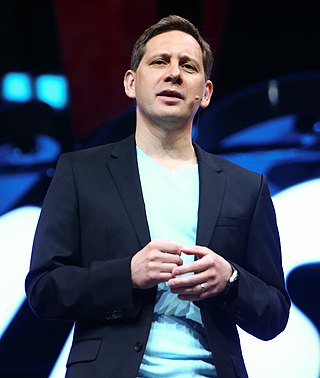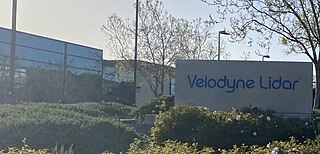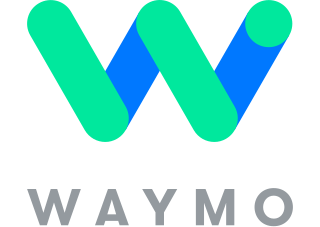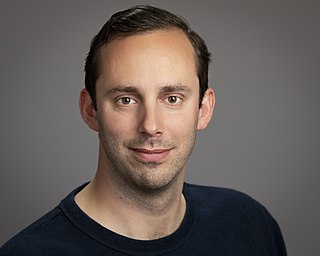
A self-driving car, also known as an autonomous car (AC), driverless car, robotaxi, robotic car or robo-car, is a car that is capable of operating with reduced or no human input. Self-driving cars are responsible for all driving activities, such as perceiving the environment, monitoring important systems, and controlling the vehicle, which includes navigating from origin to destination.

Vehicular automation involves the use of mechatronics, artificial intelligence, and multi-agent systems to assist the operator of a vehicle such as a car, lorries, aircraft, or watercraft. A vehicle using automation for tasks such as navigation to ease but not replace human control, qualify as semi-autonomous, whereas a fully self-operated vehicle is termed autonomous.

Dmitri Dolgov is a Russian-American engineer who is the co-chief executive officer of Waymo. Previously, he worked on self-driving cars at Toyota and Stanford University for the DARPA Grand Challenge (2007). Dolgov then joined Waymo's predecessor, Google's Self-Driving Car Project, where he served as an engineer and head of software. He has also been Google X's lead scientist.

Robot Operating System is an open-source robotics middleware suite. Although ROS is not an operating system (OS) but a set of software frameworks for robot software development, it provides services designed for a heterogeneous computer cluster such as hardware abstraction, low-level device control, implementation of commonly used functionality, message-passing between processes, and package management. Running sets of ROS-based processes are represented in a graph architecture where processing takes place in nodes that may receive, post, and multiplex sensor data, control, state, planning, actuator, and other messages. Despite the importance of reactivity and low latency in robot control, ROS is not a real-time operating system (RTOS). However, it is possible to integrate ROS with real-time computing code. The lack of support for real-time systems has been addressed in the creation of ROS 2, a major revision of the ROS API which will take advantage of modern libraries and technologies for core ROS functions and add support for real-time code and embedded system hardware.

Velodyne Lidar is a Silicon Valley-based lidar technology company, headquartered in San Jose, California. It was spun off from Velodyne Acoustics in 2016. As of July 2020, the company has had about 300 customers. Velodyne Lidar ships sensors to mobility industry customers for testing and commercial use in autonomous vehicles, advanced driver assistance systems, mapping, robotics, infrastructure and smart city applications. In February 2023, the company merged with Ouster.

Willow Garage was a robotics research lab and technology incubator devoted to developing hardware and open source software for personal robotics applications. The company was best known for its open source software suite Robot Operating System (ROS), which rapidly became a common, standard tool among robotics researchers upon its initial release in 2010. It was begun in late 2006 by Scott Hassan, who had worked with Larry Page and Sergey Brin to develop the technology that became the Google Search engine. Steve Cousins was the president and CEO. Willow Garage was located in Menlo Park, California.

Waymo LLC, formerly known as the Google Self-Driving Car Project, is an American autonomous driving technology company headquartered in Mountain View, California. It is a subsidiary of Alphabet Inc, the parent company of Google.

Experiments have been conducted on self-driving cars since 1939; promising trials took place in the 1950s and work has proceeded since then. The first self-sufficient and truly autonomous cars appeared in the 1980s, with Carnegie Mellon University's Navlab and ALV projects in 1984 and Mercedes-Benz and Bundeswehr University Munich's Eureka Prometheus Project in 1987. In 1988, William L Kelley patented the first modern collision Predicting and Avoidance devices for Moving Vehicles. then, numerous major companies and research organizations have developed working autonomous vehicles including Mercedes-Benz, General Motors, Continental Automotive Systems, Autoliv Inc., Bosch, Nissan, Toyota, Audi, Volvo, Vislab from University of Parma, Oxford University and Google. In July 2013, Vislab demonstrated BRAiVE, a vehicle that moved autonomously on a mixed traffic route open to public traffic.
A robotaxi, also known as robot taxi, robo-taxi, self-driving taxi or driverless taxi, is an autonomous car operated for a ridesharing company.
Ottomotto LLC, d/b/a Otto, was an American self-driving technology company founded in January 2016 by Lior Ron and Anthony Levandowski.

NuTonomy was an MIT spin-off technology startup company that made software to build self-driving cars and autonomous mobile robots. The company was founded in 2013. In August 2016, it launched its robo-taxi service in Singapore. In October 2017, Delphi Automotive purchased the company, which then became part of the Motional autonomous driving joint venture between Aptiv and Hyundai Motor Group.

Anthony Levandowski is a French-American self-driving car engineer. In 2009, Levandowski co-founded Google's self-driving car program, now known as Waymo, and was a technical lead until 2016. In 2016, he co-founded and sold Otto, an autonomous trucking company, to Uber Technologies. In 2018, he co-founded the autonomous trucking company Pronto; the first self-driving technology company to complete a cross-country drive in an autonomous vehicle in October 2018. At the 2019 AV Summit hosted by The Information, Levandowski remarked that a fundamental breakthrough in artificial intelligence is needed to move autonomous vehicle technology forward.

Argo AI LLC was an autonomous driving technology company headquartered in Pittsburgh, Pennsylvania. The company was co-founded in 2016 by Bryan Salesky and Peter Rander, veterans of the Google and Uber automated driving programs. Argo AI was an independent company that built software, hardware, maps, and cloud-support infrastructure to power self-driving vehicles. Argo was mostly backed by Ford Motor Co. (2017) and the Volkswagen Group (2020). At its peak, the company was valued at $7 billion.

Chris Urmson is a Canadian engineer, academic, and entrepreneur known for his work on self-driving car technology. He cofounded Aurora Innovation, a company developing self-driving technology, in 2017 and serves as its CEO. Urmson was instrumental in pioneering and advancing the development of self-driving vehicles since the early 2000s.
Cruise LLC is an American self-driving car company headquartered in San Francisco, California. Founded in 2013 by Kyle Vogt and Dan Kan, Cruise tests and develops autonomous car technology. The company is a largely autonomous subsidiary of General Motors. Following a series of incidents, it suspended operations in October 2023, and Kyle Vogt resigned as CEO in November 2023,. Still, the company began returning its vehicles to public roads in May 2024.
aiMotive is an autonomous vehicle technology company. The company aims to work with automotive manufacturers and Tier1s to enable automated technologies. aiMotive describes its approach as "vision-first", a system that primarily relies on cameras and artificial intelligence to detect its surroundings. The technology is designed to be implemented by automobile manufacturers to create autonomous vehicles, which can operate in all conditions and locations. In September 2017, PSA Group teamed up with AImotive.

A self-driving truck, also known as an autonomous truck or robo-truck, is an application of self-driving technology aiming to create trucks that can operate without human input. Alongside light, medium, and heavy-duty trucks, many companies are developing self-driving technology in semi trucks to automate highway driving in the delivery process.
Nuro, Inc. is an American robotics company based in Mountain View, California. Founded by Jiajun Zhu and Dave Ferguson, Nuro develops autonomous delivery vehicles and is the first company to receive an autonomous exemption from the National Highway Traffic Safety Administration.
Ryan Gariepy is a Canadian engineer, roboticist, and technology entrepreneur. He co-founded Clearpath Robotics with Matt Rendall, Bryan Webb, and Patrick Martinson in 2009, and subsidiary OTTO Motors in 2015. Gariepy currently serves as the Chief Technology Officer of both Clearpath Robotics and OTTO Motors, and as a founding board member of Open Robotics. He is named on over 40 patents and patents pending in the field of intelligent systems.
Aurora Innovation, Inc., doing business as Aurora, is a self-driving vehicle technology company based in Pittsburgh, Pennsylvania. Aurora has developed the Aurora Driver, a computer system that can be integrated into cars for autonomous driving. Aurora was co-founded by Chris Urmson, the former chief technology officer of Google/Alphabet Inc.'s self-driving team, which became known as Waymo, as well as by Sterling Anderson, former head of Tesla Autopilot, and Drew Bagnell, former head of Uber's autonomy and perception team.













